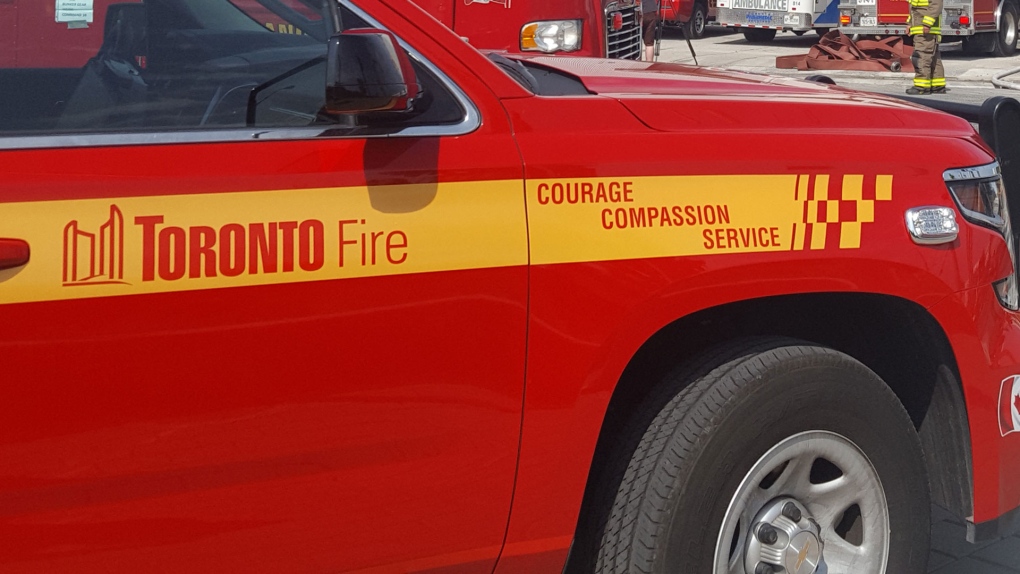Toronto firefighters mourn deaths of two colleagues due to cancer from the job
 A Toronto Fire vehicle is pictured in this file photo. (Jorge Costa /CP24)
A Toronto Fire vehicle is pictured in this file photo. (Jorge Costa /CP24)
Two Toronto firefighters recently died of cancer from their time on the job, sending colleagues into mourning and serving as a stark reminder of the hazards of the career, the city's acting fire chief said Friday.
Toronto firefighters are mourning the loss of two colleagues who died of cancer from their time on the job.
Capt. Martin Costoff died of brain cancer on Tuesday and Capt. George Daniel Thompson died on Aug. 11 from esophageal cancer, said Acting Chief Jim Jessop.
"These hit hard," Jessop said.
Costoff started his career in 1988 with North York Fire prior to amalgamation and eventually rose to the rank of captain with the Toronto Fire Service.
Thompson also began his career in 1988, but with East York Fire. He, too, rose to captain with the service.
"We have lost two of our family members," Jessop said.
"It really is a stark reminder of the dangers the women and men of Toronto Fire Service face every day."
Jessop said 50 active and retired Toronto firefighters have died of cancer from the job since Jan. 1, 2015.
All are considered to have died in the line of duty, Jessop said.
In 2007, the province amended the Workplace Safety and Insurance Act to create a statutory presumption for firefighters and fire investigators to receive compensation for heart injuries and certain cancers without having prove they are work related.
There are 17 different types of cancers on the list and firefighters must have a certain amount of time on the job for each one in order to qualify, according to a policy manual from the Workplace Safety and Insurance Board.
Costoff and Thompson began their careers, like Jessop, in an era where safety rules were different than now, the acting chief said.
"What we have seen is the longer-term impact of the materials and the combustion and the carcinogens that firefighters are exposed to everyday at work and the cumulative effect that that has on their health," Jessop said.
The job has become more dangerous over the years, largely due to the changing materials used in homes and buildings, Jessop said.
Natural materials have given way to plastic and polyurethane for many furnishings.
The time to flashover -- the point when every piece of material reaches its ignition point and an untenable situation for firefighters to enter -- has shrunk to 10 minutes, Jessop said, from about 30 minutes.
That has affected firefighters' ability to conduct search and rescue operations inside a burning building.
Those newer materials, when burned, also affect firefighters' health, Jessop said.
"You get all of the chemicals in the off-gassing," Jessop said.
"It's been proven to result in a number of cancers that firefighters are predominantly more likely to get given our occupation."
Now, Jessop said, the industry has become much more wise to the long-term dangers of fighting fires.
Firefighters now clean off their equipment right after leaving a fire, they'll leave their oxygen on so they're not breathing fumes from their gear.
Gone are the days of putting smoky helmets or gear back on, he said.
"We are cleaning, we are decontaminating and doing everything within our power to reduce the probability of future firefighters from developing cancer," Jessop said.
This report by The Canadian Press was first published Aug. 20, 2021.
CTVNews.ca Top Stories

Joe Biden pardons son Hunter Biden of gun, tax charges, despite promising not to
U.S. President Joe Biden announced Sunday that he pardoned his son Hunter Biden on gun, tax charges, despite previous promises that he would not do so.
Canada Post presents union with 'framework' to reach deal as strike continues
Canada Post has presented the union representing some 55,000 striking postal workers with a framework to reach negotiated agreements, the corporation said.
'Devastating': Missing Surrey, B.C. teen found dead, family says
The family of a missing 18-year-old, who was last seen in Surrey over a month ago, says there has been a tragic end to the search.
opinion Are you overpaying for subscriptions? It's time for an audit
From streaming platforms and apps to gym memberships and meal kits, subscriptions are convenient, but it's easy to overlook how much you're spending. Personal finance contributor Christopher Liew offers tips on how to audit your subscriptions to save money.
The best tips to prepare your car for the winter
Slippery or snow-covered roads, reduced visibility and bitter cold are all conditions that can make driving difficult and even dangerous during cold weather months. CAA spoke with CTV Morning Live this week on some of the best ways you can winterize your car.
PM Trudeau 'surprised' provinces unanimous on accelerated defence spending: Ford
Ontario Premier Doug Ford says his fellow provincial leaders are united in pushing for Canada to meet its NATO defence spending targets ahead of schedule, and that Prime Minister Justin Trudeau was "surprised" to hear it.
Stellantis CEO resigns as carmaker sales continue to slump
Stellantis CEO Carlos Tavares is stepping down after nearly four years in the top spot of the automaker, which owns car brands like Jeep, Citroën and Ram, amid an ongoing struggle with slumping sales.
'Wicked' star Marissa Bode speaks out against 'harmful' ableist comments made about her character
'Wicked' actress Marissa Bode posted a video on TikTok asking for kindness after receiving ableist comments on social media.
Poilievre calls for asylum seeker cap, border plan as U.S. tariff threat looms
Conservative Leader Pierre Poilievre has demanded the federal government present a plan before Parliament to beef up border security as U.S. president-elect Donald Trump threatens to impose stiff tariffs on Canada.


































